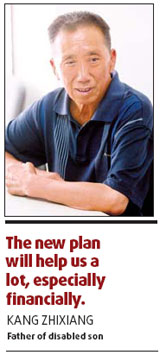For more than three decades, Kang Zhixiang has worried over caring for his disabled son. Although he is now 36, Kang Zheng is an epileptic who requires constant care from his parents.
 |
|
He Zhigang, who lost his arms in an accident when he was 11, practices calligraphy with a brush in his mouth on Wednesday in Lijiang, Yunnan province. The characters read "harmony and peace". He has also won more than 30 gold medals in track, field and swimming events for the disabled. Qin Qing
|
"I can take care of him now, but who knows what will happen to him after I die?" the 62-year-old Kang said.
For years, the family has been footing all of Kang Zheng's medical fees, which is paid out of his father's income as a hospital administrator. As she has to look after their son most of the time, Kang's wife can take up only part-time jobs that make about 500 yuan ($73) a month.
Kang himself suffered a heart attack in 2002 and was hospitalized for six days. His hospitalization and operation cost 60,000 yuan.
"Lying in the hospital bed, I was thinking I had to arrange everything for Zheng, just in case I wouldn't see him again," Kang said.

He had to borrow money from relatives for his own hospital fees and left the hospital earlier than recommended in order to save money.
But Kang, who retired two years ago, can now heave a sigh of relief.
In July, the city of Beijing instituted a new healthcare policy covering all of its residents. His son qualified for it.
"The new plan will help us a lot, especially financially," Kang said. He immediately headed for the social security office of Xiaoguan community to register for the plan.
Under the new plan, the family is only required to pay 40 percent of the cost of treatment, including medicine, if it exceeds 1,300 yuan, according to Wang Liqiang, director of the social security office in Xiaoguan.
Wang also told Kang that each participant pays an annual premium for medical insurance, but it is waived for Zheng because he is classified as severely disabled.
Normally, an unemployed person would pay a 600 yuan annual premium, and a disabled person a 300 yuan premium.
All of Xiaoguan's 67,000 residents are covered by the new healthcare plan, according to Wang. In the first month, 149 previously uninsured residents, most of them unemployed, came to Wang's social security office to apply.
As extensive as the plan is, there is still room for improvement, Wang said.
"It covers only the cost of more severe diseases, but not the fees of common illness which come to less than 1,300 yuan for each patient," Wang said, adding that it would be better for local residents if common illnesses were also covered.
"For example, I think some outpatient fees should also be included in medical insurance plans in the future," he said.
For Kang Zhixiang's family, the new plan has eliminated a long-term concern.